Of Metaphors, Models, and Malarkey
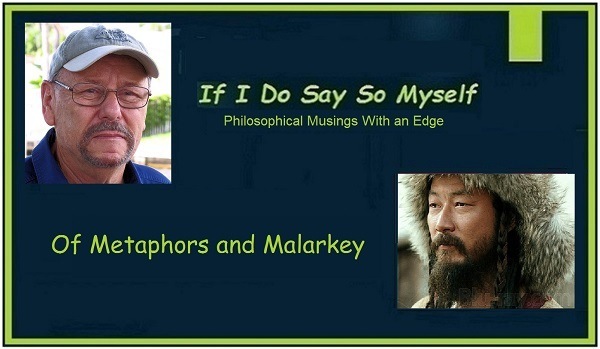
METAPHORS ARE INTENDED TO ELUCIDATE AND CLARIFY, BUT DO THEY ALWAYS?
Do not mistake obscurity for depth of thought ...
Chung King in The Wisdom of Chung King (circa 650 AD)
Not being understandable does translate into being profound. And frequently, what is incomprehensible is so simply because it is, in fact, meaningless.
Make no mistake, you can string words together into sentences that appear superficially to be saying something, but which are actually nonsensical.
Where difficult concepts and ideas are involved, metaphors and conceptual models can often be used to facilitate understanding. However, it is critical, I submit, not to confuse metaphors with conceptual models and, moreover, to always avoid being mesmerized by one's own metaphors, lest one's thoughts are led into the quagmire of obscurity.
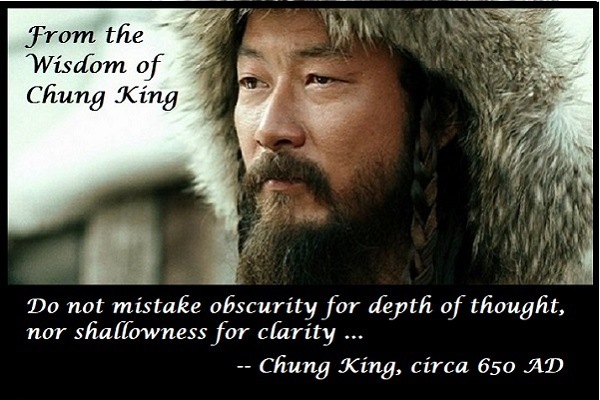
A metaphor is a figure of speech often used to elucidate an idea, occurrence, process, or system when these are too abstract or complicated to be readily understood directly.
For example, one might talk about "the trapdoor of clinical depression" as a way of describing in familiar terms how people can "fall" into depression unexpectedly and have difficulty "climbing" back out to a normal life. One might even go on to talk about the dark thoughts of depressions being like rats scurrying about in a lightless cellar (of the mind). In which case the trap door, the dark cellar, and the rats become elements of a relatively elaborate metaphor for clinical depression.
However, it would be a mistake to think that, in this case, one can learn much if anything factual about clinical depression from the trapdoor/cellar metaphor. Moreover, if one insists on trying, the result is likely to be confusion, not elucidation, obscurity, not clarity — in a word, malarkey.
Because a metaphor is not a model ...
A model is also a device employed to elucidate an idea, occurrence, process, or system, when these are too abstract or complicated to be readily understood directly or when the phenomena being discussed are not directly observable.
There are different kinds of models, both physical and conceptual.
Some physical models are precisely that, miniatures of full-size physical objects, such as airplanes, automobiles, and ships. Often such physical models are deployed in purpose-created testing environments, such as wind tunnels and test tanks, for the purpose of investigating the likely behaviors of the full-size object(s) being studied.
A classic instance of physical modeling is the behavior of running water in pipes modeling the behavior of electricity running through wires.
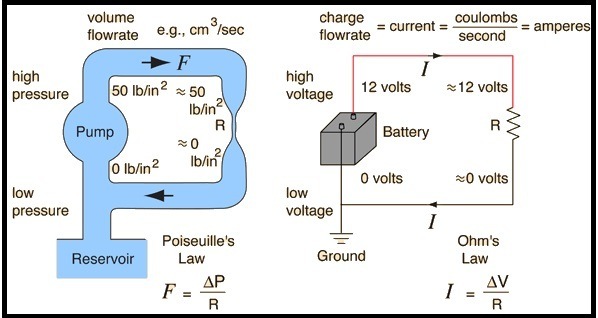
You cannot directly observe electrical current being carried in through wires. (Note, you can observe the effects of such current, but that is not to observe the current itself.) You can, however, observe water running through pipes. And you can gain insight into the relationships between electrical voltage, amperage, and resistance by considering the relationships between pressure, flow volume, and cross-sectional constriction in the piping carrying the water.
Some conceptual models are actually mathematical formulae, in which the relative behaviors of multiple elements in an equation "mirror" those of elements in a physical system. Such mathematical models are common in Engineering, where elements of formulae represent properties of materials and structures in the physical world, and in which manipulation of such contained elements provides insight into, for instance, how to achieve the highest load-bearing capability in a given structure at the lowest unit weight.
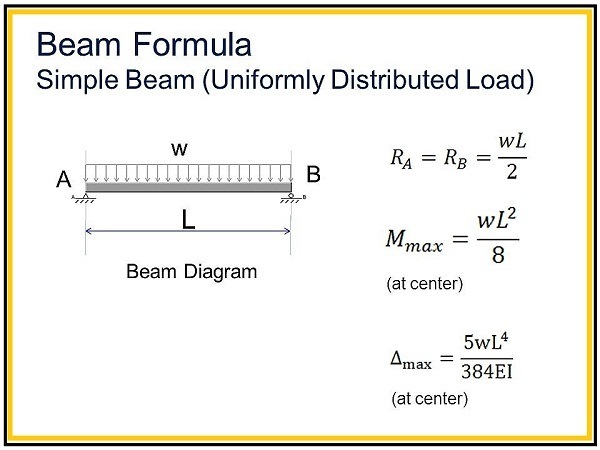
Models can also be parsed as either descriptive or predictive, and as fully isomorphic or only partially so. But an important characteristic of conceptual models is that their internal elements bear a relationship to one another that "mirrors" the relationship between the internal elements of the subject system being modeled. Prime examples of this are the predictive (both statistical and dynamical) models on the basis of which a lot of hurricane forecasting is performed.
Once a sufficient level of isomorphism is established between a model and subject system it models, the model itself can be explored for insights into the workings of the subject system. And that is an important reason models are created and manipulated in a scientifically and logically rigorous manner.
Metaphors, similes, and analogies grease the wheels of Appreciation but they do not lubricate the drill of Insight ...
A self-similar metaphor by Phil Friedman
Metaphors, similes, analogies are literary stylistic devices. They are neither constructed nor probed for validity and confirmation in the way scientific and conceptual models are. We should, therefore, not look to such devices for factual or normative insights or conclusions.
More importantly, when such a conclusion is presented, we should not be hypnotized by the undulating fluidity of a metaphor or analogy offered up in its support. For when we do, we invite Malarkey and its cousin, Gibberish, to the conversation. — Phil Friedman
Author's Notes: If you enjoyed this post and would like to receive notifications of my writing on a regular basis, simply click the [FOLLOW] button on my beBee profile. Better yet, elect there to follow my blog by email. As a writer-friend of mine says, you can always change your mind later.
As well, feel free to "like" and "share" this post and my other articles — whether on beBee, LinkedIn, Twitter, Facebook, or Google+, provided only that you credit me properly as the author, and include a live link to my original post.Should you be curious about some of my previous musings along similar lines, you're invited to take a look at the following prior posts:
"Collectives Versus Individuals"
"On Forcing Perception to Fit Preconception"
"Reason and Rationality Do Not Exclude Intuition or Creativity"
As to the origin of the quote from Chung King, see
"Six Life Lessons for Today from Chung King"
About me, Phil Friedman: With some 30 years background in the marine industry, I've worn different hats — as a yacht designer, boat builder, marine operations and business manager, marine industry consultant, marine marketing and communications specialist, yachting magazine writer and editor, yacht surveyor, and marine industry educator. I'm also trained and experienced in interest-based negotiation and mediation.
In a previous life, I was formally trained as an academic philosopher and taught logic and philosophy at university.
Before writing comes thinking (The optional-to-read pitch):
As a professional writer, editor, university educator, and speaker, with more than 1,000 print and digital publications, I've recently launched an online program for enhancing your expository writing: learn2engage — With Confidence. My mission is to help writers and would-be writers improve their thought and writing, master the logic of discussion, and strengthen their ability to deal with disagreement.
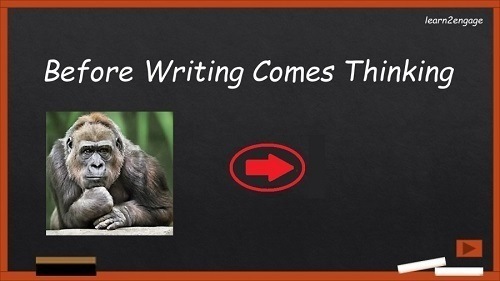
For more information, click on the image immediately above. To schedule an appointment for a free 1/2-hour consult email: info@learn2engage.org. I look forward to speaking with you soon.
Text Copyright 2017 by Phil Friedman — All Rights Reserved
Image Credits: Phil Friedman, Google Images, and FreeDigitalPhotos.net

#METAPHOR #CONCEPTUALMODELS #LITERARYDEVICES #REASONING #INSIGHT
Articles from Phil Friedman
View blog
RUNNING ON RAILS DOESN'T GET YOU ANYWHERE, WHEN THE TRACK DEADENDS... · If you are tired of having y ...

LOOKING BACK AT THIS PIECE I WROTE FOR PASSAGEMAKER MAGAZINE IN 2014, IT SEEMS THAT THE DARK CLOUD S ...

MAKE NO MISTAKE: TRADING IN CRYPTO-CURRENCIES IS A ZERO-SUM GAME... · The number of cryptocurrencies ...
Related professionals
You may be interested in these jobs
-
Experienced Warehouse Planner
Found in: Lensa US P 2 C2 - 3 days ago
WorkBox Staffing Norcross, United StatesEXPERIENCED WAREHOUSE PLANNER - $24/ hr. Norcross Area - 8 am - 5 PM M-F MUST HAVE EXPERIECE Core Responsibilities Plan both short- and long-term to align supply and demand to support inventory needs. Project forward-looking inventory Facilitate mee Warehouse, Planner, Experience ...
-
Davenport Operator
Found in: beBee S2 US - 3 days ago
AIMS Advantage INC Grand Rapids, United States Full timeJob Title: Davenport Operator · Job Overview: We are seeking a skilled and detail-oriented Davenport Operator to join our manufacturing team. The Davenport Operator will be responsible for setting up, operating, and maintaining Davenport screw machines to produce high-quality pre ...
-
PRN Critical Care APP opportunity in Chattanooga, Tennessee
Found in: Lensa US P 2 C2 - 1 day ago
Parkridge Medical Center Chattanooga, United StatesDescription · Specialization: · Acute Care · Job Summary: · Parkridge Medical Center and Intensive Care Consortium (ICC) are seeking experienced acute care nurse practitioners or physician assistants to join the team in Chattanooga, Tennessee. · Qualified Candidates: APP pro ...




Comments
Phil Friedman
6 years ago #38
Peter, I will tweet you my answer tomorrow morning at 3:30 am. Attna time when all seems connected and it is possible to construct first-class gibberish. Watch for it! Cheers.
Phil Friedman
6 years ago #37
Peter, how one views Apophenia depends, it seems, on how much weight one gives to the modifier “seemingly”. Some see it as aberrant cognition: “Apophenia is the spontaneous perception of connections and meaningfulness of unrelated phenomena. The term was coined by German neurologist and psychiatrist Klaus Conrad (1905-1961). Conrad focused on the finding of abnormal meaning or significance in random experiences by psychotic people.” As to whether it has a metaphoric use, I might allow, “His writings appeared as organized as an Apophenisc’s breakfast.” Thank you for reading and for joining the conversation. Cheers!
Phil Friedman
6 years ago #36
Peter, how one views Apophenis depends, it seems, on how much weight one gives to the modifier “seemingly”. Some see it as aberrant cognition: “Apophenia is the spontaneous perception of connections and meaningfulness of unrelated phenomena. The term was coined by German neurologist and psychiatrist Klaus Conrad (1905-1961). Conrad focused on the finding of abnormal meaning or significance in random experiences by psychotic people.” As to whether it has a metaphoric use, I might allow, “His writings appeared as organized as an Apophenisc’s breakfast.” Thank you for reading and for joining the conversation. Cheers!
Harvey Lloyd
6 years ago #35
Wish i could claim the metaphor but it was used during the last president's term by conservatives as part of their dogma when meeting the othersides dogma. Seemed appropriate here. Thanks
Phil Friedman
6 years ago #34
Paul \ - As writers or editors? But anyway, I am sure you'd agree that a criterion for the use of a metaphor is that it improves the clarity of what is being said and does not itself, because of its own complications, become the subject of a separate "investigation" as to what it means. Eh? (Just a bit of Canadian thrown in their for colour. :-)
Phil Friedman
6 years ago #33
Paul \, I am not here admonishing anyone to abandon metaphors. Only pointing out that the metaphor is a device for communicating concepts and ideas which are otherwise difficult, in some venues, to understand. And that we should not fall into the trap of thinking that the metaphor becomes the primary target of exploration. we can use a metaphor to describe in a more understandable way, for example, depression but we cannot study the metaphor in order to learn more about depression. In order to gain knowledge of depression, we need to study the phenomenon itself. Thank you for the suggestion re #buzzBeBee, I will follow up (and notify Jim,as well).
Phil Friedman
6 years ago #32
I believe, Harvey, that we are on the same page on this. Metaphors are useful for restating abstract or difficult concepts in terms free of arcane jargon and, thereby, conveying a measure of understanding to what we might call a "lay" audience. But, as you very correctly note, we cannot study and learn FROM the metaphor because it, of needs, does not sufficiently mirror that which is under discussion. BTW, I like your "empty suit" metaphor. Very apt, very pointed. Thanks and cheers!
Harvey Lloyd
6 years ago #31
I agree with your approach and that we can move away from facts within the metaphor delivery. More importantly i think that just because i understand the metaphor of "depression" i cant offer advice from the metaphor. Just because i know how a trap door works does not imply factual understanding of depression. I would sense that you come from the approach of technical when you view a metaphor. Myself, working with non-verbal children who can't share within the larger metaphysical aspects of life, the metaphor process means something different. Within the physics of life i would agree but see the metaphor as an opportunity for those who are lay people within a context to get a small grasp of the concept. Depending how "lay" the audience is determines how much you lean on the metaphor. My assumption is the person using the metaphor understands the underlying facts and in someway is trying to retain my interest in something that is complicated. As you stated though, i have encountered many that the metaphor is all that is being presented, or otherwise known as the empty suit. I do believe these days that there many more empty suits in the marketplace than we would care to admit..
Phil Friedman
6 years ago #30
Thank you, Lada \ud83c\udfe1 Prkic, for reading and commenting. I was looking forward to having your opinion as an engineer and academic, especially since mathematical models play such a strong role in understanding structural design. I agree that it’s often advantageous to use metaphors instead of scientific jargon to explain scientific concepts and systems to a lay audience. (Feynman) But I also think we need to keep in mind always that metaphors are tools of explanation and are NOT the same sort of animal as models, which are mirrors for exploration. For confusing the two almost always leads to the generation of ... poppycock, as well as malarkey and gibberish. :-)
Phil Friedman
6 years ago #29
Thank you @Lada firmreading and commenting. I was looking forward to having your opinion as an engineer and academic, since mathematical models play such a strong role in understanding structural design. I agree that it’s advantageous to use metaphors instead of scientific jargon to explain scientific concepts and systems to a lay audience. But I think we need to keep in mind always that metaphors are tools of explanation and are NOT the same sort of animal as models, which are mirrors for exploration. For confusing the two almost always leads to the generation of ... poppycock. :-)
Lada 🏡 Prkic
6 years ago #28
Phil Friedman
6 years ago #27
My error, Randall Burns will testify. Cheers!
Randall Burns
6 years ago #26
LMAO!!! Oversensitive? I was trying to be funny but it's all good...
Phil Friedman
6 years ago #25
Randall Burns, you are spot on -- except I think you are being a bit over-sensitive, admittedly in my defense. The reaction hs been relatively mild compared to that I've engendered in times past. But just so we're all clear about what I'm saying. You are correct that this piece is NOT an admonition to forsake all use of metaphor. Rather it is a warning not to become so fascinated with metaphors that you allow yourself to be led into writing and speaking malarkey. Metaphors are legitimate literary devices (tools), as are similes and analogies. And they can sometimes be used to advantage when one is trying to elucidate a difficult or unfamiliar idea or cluster of concepts. But -- and this is my core point if there is one -- you cannot study a metaphor in the way you can study a model in order to gain knowledge of the subject entity. Thanks for joining the conversation. And cheers!
Randall Burns
6 years ago #24
Phil Friedman
6 years ago #23
Thank you, Franci\ud83d\udc1dEugenia Hoffman, beBee Brand Ambassador, for reading and taking the time to comment. Iagree with you that too often metaphors, especially when over-used, can actually confuse an issue rather than clarify it.And this is doubly true when someone becomes so enamored of metaphors that he or she speaks almost exclusively of them.
Phil Friedman
6 years ago #22
Gert Scholtz, I think in the main you are correct. A metaphor is a tool used at times to stimulate insight... maybe. But you cannot learn anything about the original object or system or idea or cluster of ideas by studying the metaphor itself. That is NOT the case for a "model". Once you've empirically confirmed sufficient isomorphism between the model and the subject modeled, you can generally benefit in terms of understanding by studying the model, especially when the object or system being modeled cannot be directly observed. My issue with what frequently happens on social media is that some writers use a metaphor to help the reader understand something about an object, system, or cluster of ideas, but then fall into flopping back and forth between inferring things about the subject from the metaphor, then inferring things about the metaphor from the subject. Welcome Malarkey and its cousin Gibberish. Cheers!
Phil Friedman
6 years ago #21
Harvey, speaking candidly I am uncomfortable with the term "metaphoric understanding" -- almost as much so as with the notion of metaphysics in the absence of an underlying epistemology. As well, I reject your assertion that, "the facts of understanding that which is a mistake and that which is not, is subjective to the position you take, events or context of setting." All perceptions, cognitions, and judgments are made from the perspective of the individual who has or makes them. In that sense, yes, you can say they are "subjective", but that does not mean they are baseless or can be made arbitrarily and have as much validity as those made with attention, support, and reason. And, of course, the obverse of that is one can be more or less mistaken, depending on how one has developed one's judgment of "the facts". Consequently, the admonition quoted, not to mistake obscurity for depth, is to my mind perfectly in order -- although I do admit the provenance of the quotation may be questionable. As to my reference to depression, you might see it as a "metaphysical" state if you deal with it soley in terms of metaphors, but you will see it as more objectively part of the physical universe if you seek to understand it the context of brain and body, as I would guess Ian Weinberg does. That, however, is not my point. My assertion is that investigating the metaphor referenced will not yield an understanding of the phenomenon, although the metaphor may give the illusion (or feeling) of understanding. I recommend reading the work of epistemologist, A. J. Ayer, in order to get a handle of understanding and scientific (objective) meaning, the opposite of which is precisely what we gain when we are enamored of metaphor. IMO. Cheers!
Gert Scholtz
6 years ago #20
Phil Friedman
6 years ago #19
Thank you, Ian Weinberg, for joining the conversation. I am fully comfortable with your view -- although admittedly, it may be "subjective". Here is something I would like everyone to consider: Perception, understanding, and judgment are always "subjective" in the sense that, unless you are one of the rare among us who can spirit-walk, they are experienced from a given individual's perspective.That does not, however, mean that such perceptions, understanding, or judgments are all of equal value or no value. For some will be better developed, some will be better reasoned and supported, and some will be closer to objective reality, than others. The job, if you will, of the Left Hemisphere is to assure that these necessarily subjective activities are as accurately developed as possible. Cheers!
Phil Friedman
6 years ago #18
Very succinct -- and insightful -- Jerry Fletcher, if I do say so myself. As I wrote this piece, I found myself wanting, at least in part, to demonstrate that about which I also wanted to speak. The result, as you very perspicuously point out, is an odd blend of actual analysis and ... well, malarkey. BTW, I think I prefer "befuddle" to "bamboozle". Thanks for reading and commenting. Cheers!
Phil Friedman
6 years ago #17
Harvey, thank you for reading and commenting. Your comment requires a longer than usual reply, so please be patient. I will respond as soon as I can. Cheers!
Ian Weinberg
6 years ago #16
Jerry Fletcher
6 years ago #15
Harvey Lloyd
6 years ago #14
Phil Friedman
6 years ago #13
I am pleased, Pascal Derrien, to see that you “get” the piece. For it turns upon itself and is a blend, I think, of substantive truth embedded in a matrix of malarkey. And it is intended to challenge the reader to ask some serious questions.
Phil Friedman
6 years ago #12
Jim, the answer is one doesn’t and wouldn’t. A metaphor is a tool of expression, while a model is a “mirror” or reflection of something in the world that cannot be readily observed directly. That is why it makes sense to sometimes explore a model, but not so a metaphor. For examining a metaphor for all its hidden implications is like analyzing a selfie. Cheers!
Phil Friedman
6 years ago #11
Melissa, My vision Is like a lesion. It’s a break in my shell, And a torment as well. — Anonymous
Phil Friedman
6 years ago #10
Melissa, My vision Is like a lesion. It’s a break in my shell, And atorment as well. — Anonymous
Pascal Derrien
6 years ago #9
Jim Murray
6 years ago #8
Phil Friedman
6 years ago #7
The problem, Melissa, is that, if I explain it, its purpose will be defeated. For as you know, as the waterfall is composed of an ever-changing array of droplets, one can concatenate any number of facts, yet never speak a single truth. Perhaps, some pre-study in the Wisdom of Chung King might help. And in that respect, should you be interested in that, I recommend the conceptual guidance of Dr. Gerald Hecht, Ph.D., who is the official guardian of the Second Scroll. Please thank me not, for it is I who am indebted to you for the truly lovely word "apophenia" which has triggered in my psyche the emergence of the appellation "apopheniac" and in so doing has brought insight into so much that is published on social media. Cheers!
Phil Friedman
6 years ago #6
If your insight rides in the Chariot of Metaphor, Kevin Pashuk, do keep checking the wheels. For your Thought may have blown a tire.
Kevin Pashuk
6 years ago #5
Phil Friedman
6 years ago #4
Phil Friedman
6 years ago #3
Randall Burns, you are as wise (or perhaps wise-ass) as Chung King. Stick with me, bud, and you'll soon be cooking with gas. Cheers!
Randall Burns
6 years ago #2
Phil Friedman
6 years ago #1